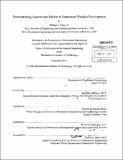Understanding success and failure in outsourced product development
Author(s)
Palm, William J. (William John), IV
DownloadFull printable version (26.41Mb)
Other Contributors
Massachusetts Institute of Technology. Dept. of Mechanical Engineering.
Advisor
Daniel E. Whitney.
Terms of use
Metadata
Show full item recordAbstract
Companies that develop new products increasingly outsource product design, a trend that has prompted much concern but little evidence on its effectiveness. This dissertation uses a combination of interviews, cross-case analysis, and survey data to examine the meaning, measurement, and causes of success in one type of outsourced development: design and innovation consulting. The first study identifies the many dimensions of success and demonstrates that consultants, clients, and scholars prioritize them differently. Clients emphasize the value and quality of the deliverable, while consultants prioritize design elegance, novelty, and commercial success. Client satisfaction, heretofore little used in outsourcing research, correlates highly with most success dimensions. The second study uses the identified success measures to assess 134 consulting projects. Rates of product commercialization and market success compare favorably to results previously reported for in-house development. Client satisfaction is comparable to that of other service industries but varies greatly across projects. Most outcome measures are robust to measurement timing but depend strongly on the seniority of the respondent and the level of anonymity afforded him or her during assessment. The third study identifies over fifty factors believed to influence project outcomes and distills them into two pedagogical frameworks. The final study combines these factors with theories of customer satisfaction and product development to generate explanatory models of client satisfaction and other project outcomes. Nearly 80% of the observed variation in satisfaction can be explained after the fact, and 36% predicted before the project begins. Contrary to prior reports, design consultancies are least effective at radical innovation. Rather, they excel at rapid innovation in familiar product categories, designing products far more quickly than bureaucratic organizations and inexperienced start-ups can. Client satisfaction is unaffected by corporate cultural distance between parties, and actually declined with decreased physical distance and increased manufacturer involvement, challenging conventional wisdom in product development. The dissertation contributes to understanding of outsourced product development by clarifying key concepts such as success, demonstrating the impact of methodological details on its measure, and developing novel survey methods to gather unique outcome data from a broad range of respondents.
Description
Thesis (Ph. D.)--Massachusetts Institute of Technology, Dept. of Mechanical Engineering, 2011. Cataloged from PDF version of thesis. Includes bibliographical references.
Date issued
2011Department
Massachusetts Institute of Technology. Department of Mechanical EngineeringPublisher
Massachusetts Institute of Technology
Keywords
Mechanical Engineering.